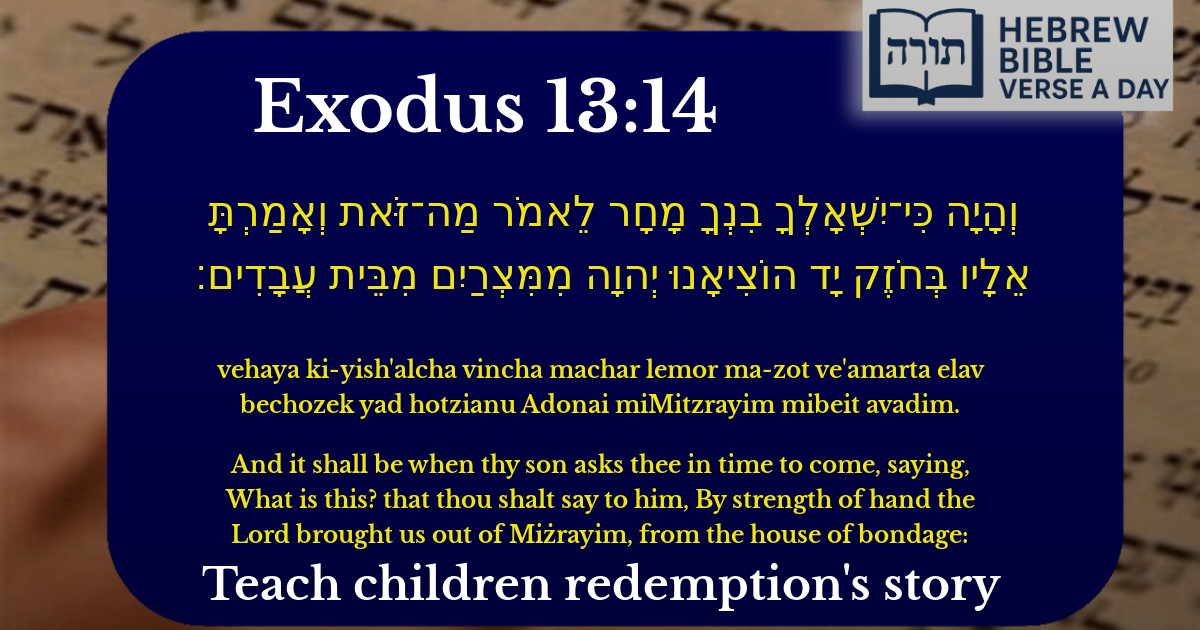Join Our Newsletter To Be Informed When New Videos Are Posted
Join the thousands of fellow Studends who rely on our videos to learn how to read the bible in Hebrew for free!
Hebrew Text
וְהָיָה כִּי־יִשְׁאָלְךָ בִנְךָ מָחָר לֵאמֹר מַה־זֹּאת וְאָמַרְתָּ אֵלָיו בְּחֹזֶק יָד הוֹצִיאָנוּ יְהוָה מִמִּצְרַיִם מִבֵּית עֲבָדִים׃
English Translation
And it shall be when thy son asks thee in time to come, saying, What is this? that thou shalt say to him, By strength of hand the Lord brought us out of Miżrayim, from the house of bondage:
Transliteration
Vehaya ki-yish'alcha vincha machar lemor ma-zot ve'amarta elav bechozek yad hotzianu Adonai miMitzrayim mibeit avadim.
Hebrew Leining Text
וְהָיָ֞ה כִּֽי־יִשְׁאָלְךָ֥ בִנְךָ֛ מָחָ֖ר לֵאמֹ֣ר מַה־זֹּ֑את וְאָמַרְתָּ֣ אֵלָ֔יו בְּחֹ֣זֶק יָ֗ד הוֹצִיאָ֧נוּ יְהֹוָ֛ה מִמִּצְרַ֖יִם מִבֵּ֥ית עֲבָדִֽים׃
וְהָיָ֞ה כִּֽי־יִשְׁאָלְךָ֥ בִנְךָ֛ מָחָ֖ר לֵאמֹ֣ר מַה־זֹּ֑את וְאָמַרְתָּ֣ אֵלָ֔יו בְּחֹ֣זֶק יָ֗ד הוֹצִיאָ֧נוּ יְהֹוָ֛ה מִמִּצְרַ֖יִם מִבֵּ֥ית עֲבָדִֽים׃
🎵 Listen to leining
Parasha Commentary
📚 Talmud Citations
This verse is quoted in the Talmud.
📖 Pesachim 116a
The verse is referenced in the context of the Passover Haggadah, where it is part of the explanation given to a child who asks about the significance of the Passover rituals.
📖 Berakhot 40b
The verse is discussed in relation to the obligation of recounting the Exodus from Egypt, emphasizing the importance of teaching children about the miracles performed by God.


Context of the Verse
This verse appears in Shemot (Exodus) 13:14, following the laws of sanctifying firstborn animals and redeeming firstborn sons. It is part of the broader narrative of the Exodus from Egypt, emphasizing the importance of transmitting the story of redemption to future generations.
Rashi's Explanation
Rashi explains that the phrase "כִּי־יִשְׁאָלְךָ בִנְךָ מָחָר" ("when your son asks you in time to come") refers to the ben rasha (the "wicked son") mentioned in the Haggadah of Pesach. This son asks "מַה־הָעֲבֹדָה הַזֹּאת לָכֶם" ("What is this service to you?"), excluding himself from the community. The response—"בְּחֹזֶק יָד הוֹצִיאָנוּ יְהוָה מִמִּצְרַיִם" ("By strength of hand the Lord brought us out of Egypt")—is meant to remind him that Hashem redeemed us personally, and had he been in Egypt, he would not have been worthy of redemption.
Rambam's Perspective
In Hilchot Chametz U'Matzah (7:2), the Rambam emphasizes the mitzvah of recounting the Exodus to children, particularly in response to their questions. He notes that the Torah provides different responses based on the child's level of understanding, reinforcing the principle of chinuch (education) tailored to each individual.
Midrashic Interpretation
The Mechilta (a halachic Midrash on Shemot) elaborates that the phrase "בְּחֹזֶק יָד" ("by strength of hand") alludes to the ten plagues and the miraculous nature of the Exodus. It teaches that Hashem's intervention was not through natural means but through overt divine power, a foundational belief in Judaism.
Practical Lesson